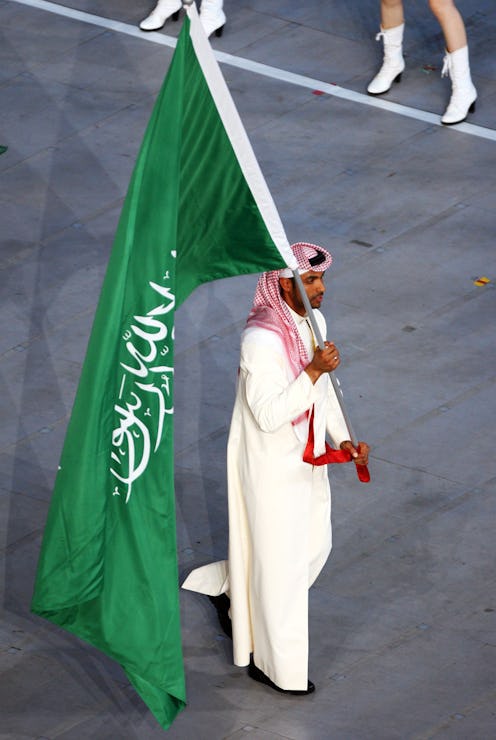News
The Saudi 'Girls Council' Isn't The Problem

When photos of a supposedly all-male panel at a meeting of a "Girls Council" in Qassim Province, Saudi Arabia went viral, British and American media predictably jumped on the story. Yet again, the Saudis were proving themselves to be one of the worst countries in the world for their (mis)treatment of women. But what the Daily Mail, Telegraph, and even the BBC glossed over was that there were women on the panel, but that they were in another room communicating via video. The Western response to the Saudi "Girls Council" shows a major pitfall of criticizing other cultures from a Western perspective — especially when that culture is often the subject of bigotry in Europe and the U.S.
To be clear, as an Arab-American feminist, I absolutely deplore the Saudis' gender politics. I understand why the image of the male part of the "girls" panel went viral, especially juxtaposed with the now-viral image of a bunch of men watching President Donald Trump sign his infamous "global gag rule" order.
But the headlines about the "Saudi 'Girls Council' without girls" have been dishonest, misleading, and arguably yet another way to demonize Saudi Arabia, and Arabs and Muslims by extension. Yes, having a gender-segregated "girls council" seems strange by Western standards, but it's not like our standards are universally followed in the West, as gender-segregated clubs show.
For me and most Muslim feminists I know, drawing the line between justified criticism of mistreatment of women in Muslim-majority countries and defense of Muslims in the wake of rampant Islamophobia is incredibly difficult. Even the wording of such arguments is complicated — I choose to say "women in Muslim-majority countries" rather than "women in Islam" or "women in Muslim countries," because women's rights (or the lack thereof) are, like so many other facets, cultural rather than religious in nature. The cultures of Muslim-majority countries have been unduly harmed by Western colonialism, and the cycle of mistreatment of women in Muslim-majority countries continues in a supposedly "post-colonial" world, often aided and abetted by the Islamophobia of the West.
I am no scholar in the history of colonization or women's rights in Saudi Arabia, but I know from own experiences as an Arab-American growing up post-9/11 that images ridiculing or "othering" Arabs serve an explicitly propagandist purpose. The "clash of civilizations" idea that pits so-called "Muslim civilization" against "Western civilization" is echoed by the now-infamous Iowa Rep. Steve King, his idol Geert Wilders (known as "Dutch Trump"), and President Donald Trump, and images of seemingly sexist Saudi sheikhs is another small example of the myriad ways people buy into this dangerous myth.
In case it wasn't clear enough before, I don't think the gender-segregated "Girls Council" in Qassim is right or fair, but I do think this relatively minor example of Saudi sexism says much more about inherent pro-Western and Islamophobic bias in the concern-trolling of Muslim women.
It's easier to criticize some clueless Saudi sexists than it is to remind oneself that the U.S. is allied with Saudi Arabia despite its human rights violations, or that the policies of our own clueless, sexist regime will result in extreme harm for women around the world.
The gender segregation and all male panel members on stage for the Qassim "Girls Council" might seem funny or wrong to some Westerners, but making them the butt of jokes does nothing but uphold an oppressive ideology that has no business in supposedly feminist arguments.